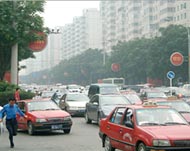Chinese bio-fuel: A breath of fresh air
Chinese officials are hoping greater use of organic fuel will help produce cleaner air before the 2008 Beijing Olympic Games.

Like many other agricultural giants such as Brazil, the United States, and India, the northeast province of Jilin is using its huge crop surplus to make organic fuel that cuts pollution and reduces dependency on petroleum imports at the same time.
Industry sources say, China, which is the world’s fastest growing car and energy market, could extend the use of ethanol petroleum throughout the country by 2005 if exploratory steps are successful.
With car sales doubling this year to over two million, the International Energy Agency forecast that China would overtake Japan next year as the second largest oil consumer after the United States.
Although an Olympics shrouded in smog is not a scene China wants to show the world, it is what it will look like unless the traffic pollution in major cities is brought under control.
In Jilin, not far from the provincial capital Changchun, one of the world’s largest fuel ethanol plants is currently gearing up for full operation.
Blended petrol
From 18 October, all car, truck and bus drivers in the province must use blended petrol, 10% of which must be bio-fuel distilled from maize.
 |
|
Government wants to avoid an |
A similar policy nationwide would make a significant dent in regular petrol consumption, which totalled more than 37 million tonnes last year.
Fuel ethanol cuts greenhouse gas emissions that are held responsible for global warming. It can be produced also from wheat, sugar, rapeseed, palm oil, cassava or even recycled food oil, such as old frying oil collected from fast food restaurants.
Jilin, which is three times the size of Austria, accounts for more than 10% of China’s annual maize output of about 120 million tonnes, the second biggest after the United States. It takes about three tonnes of maize to produce one tonne of ethanol.
Increasing capacity
Jilin Fuel Ethanol, a joint venture between the China National Petroleum Corp (CNPC), China Resources Enterprises Ltd and Jilin Grain Group (JGG), is to convert 900,000 tonnes of maize into 300,000 tonnes of fuel ethanol each year. It plans to double its capacity to 600,000 tonnes after that.
China has recently been trying to pull back from grain export markets because it cannot continue to pay out the export subsidies it used to under World Trade Organisation rules.
“To help the fuel ethanol company is to help improve farmers income, restructure the old agriculture system and help maintain social stability,” Hong Hu, governor of Jilin province, said. “It’s a top government agenda item.”
Over the past decade, China accumulated massive grains stocks as results of its policy of food security but these are now costing a fortune in storage fees, and are depressing prices of new crop, which hurts farmers.
Jilin alone is estimated to have over 20 million tonnes of maize in stock.